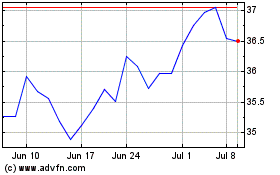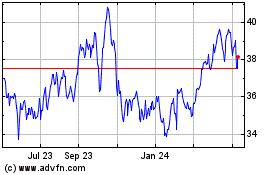By Sarah Kent in London and Christopher M. Matthews in New York
Six years after a deadly blowout sent a slick of oil floating
along the Gulf Coast for months, BP PLC disclosed almost $1 billion
in fresh charges that bring its total bill from the disaster to
more than $56 billion and counting.
The British oil giant is struggling to control the spiraling
costs even though it reached a roughly $20 billion agreement --
among the largest corporate penalties in U.S. history -- to resolve
all state and federal claims and was supposed to close a chapter on
the spill.
But separate lawsuits related to the Macondo well blowout off
the Louisiana coast have inflated the bill further and could drag
on for years, reflecting the enormous level of legal complexity
surrounding the spill, legal experts said.
BP's penalties already dwarf the fines levied on individual
banks involved in the subprime mortgage crisis or the 1989
Exxon-Valdez spill, which cost the company then known as Exxon $4.3
billion.
BP on Tuesday said it couldn't predict how much more costs would
go up.
"It's impossible to come up with a best estimate," Chief
Financial Officer Brian Gilvary told analysts.
The mounting bills drew renewed attention on Tuesday, when the
company reported a $485 million quarterly net loss that was largely
caused by an unexpected $917 million charge mostly related to a
separate settlement with Gulf Coast businesses and residents harmed
by the spill. The settlement has grown by $5 billion over the past
four years.
BP's shares rose 4.3% on Tuesday, as its financial performance
beat analysts' expectations for a three-month period when oil
prices averaged $34 a barrel -- the lowest in over a decade. Shares
settled at their highest level since January.
"Given Macondo risk is behind us (except for the Hollywood movie
in [September]) we think the stock is too cheap," Bernstein
Research analyst Oswald Clint said in a note, referring to the
coming disaster drama "Deepwater Horizon." The movie, which stars
Mark Wahlberg, takes its name from the drilling rig destroyed in
the explosion.
BP has said the $20 billion agreement that it reached last July
-- and which was approved by a federal judge earlier this month --
to settle Clean Water Act Penalties and claims from several Gulf
Coast states gave it certainty over the spill's largest potential
liabilities. "We can now chart our own course," Chairman
Carl-Henric Svanberg told investors earlier this month. BP could
have faced billions of dollars in fines more than what it settled
for.
Moody's Investors Service maintained its positive outlook for
BP's debt but said continuing costs related to the spill would drag
on the company's earnings and cash flow.
The Macondo well exploded on April 20, 2010, killing 11 workers
and releasing more than 3 million barrels of oil a day into the
Gulf of Mexico over 87 days. The spill hurt the Gulf fishing
industry, killed untold numbers of wildlife and caused health
complaints from people who helped cleanup efforts.
The company's costs began mounting soon after. In 2010 it set
aside an initial $40.9 billion to cover spill costs, including its
efforts to cap the well and a $20 billion compensation fund for
victims.
The spill forced BP to sell more than $40 billion in assets,
pull back its ambitions and craft its business around a smaller set
of high-value oil and gas fields.
The continuing fallout from the massive oil spill is weighing on
the company during an exceptionally difficult period for the energy
sector, with oil prices hitting a 13-year low during the first
quarter. A glut in global crude supply is dragging down earnings
across the industry and forcing painful spending cuts.
To date, BP has incurred legal and cleanup costs of $56.4
billion, including nearly $9 billion in government fines and more
than $8 billion on environmental cleanup. The company still has a
host of claims facing it falling into several categories, attorneys
involved said.
There is the company's 2012 class-action settlement with more
than 100,000 Gulf Coast residents. BP initially estimated that
settlement would cost it $7.8 billion, but that figure has since
ballooned to $12.9 billion, including $600 million more in the
first quarter. The company said it has processed more than
two-thirds of the claims related to the 2012 settlement, but the
final cost is likely to be significantly higher.
There are also costs for certain civil claims outside of the
2012 settlement on economic, property or medical damage claims,
said Brent Coon, a Texas lawyer representing spill victims. And
businesses in the real estate, gaming and financial industry have
yet to settle with BP.
Mr. Coon represents some 3,000 victims who opted out of the 2012
settlement and are still pursuing claims against the company. Mr.
Coon said there were likely more than 5,000 people who opted out.
Those claims will ultimately be decided by the same New Orleans
court that handled the settlements in 2012 and 2015.
Daniel Jacobs, a former lawyer in the Justice Department's
environmental division and now a lecturer at American University in
Washington, D.C., said that a group of securities class-action
lawsuits against BP in Houston could represent the company's
largest remaining legal exposure to the spill.
Investors who bought BP stock in the days after the well blowout
who claim the company misled them about the extent of the spill are
suing in Houston federal court, seeking more than $2 billion in
damages, according to court filings.
The suit has survived BP's efforts to dismiss it, and could go
to trial. Mr. Jacobs said those suits could cost the company
billions of dollars. BP has said the claims are without merit.
BP is expected to begin paying off the $20 billion federal
settlement later this year, with payments made expected to average
around $1.1 billion annually over a period of 18 years. The company
said it plans to sell assets to cover the cost of settlement
payments.
The spill forced the company to sell more than $40 billion in
assets, pull back its ambitions and craft the business around a
smaller set of high-value oil and gas fields.
Write to Sarah Kent at sarah.kent@wsj.com and Christopher M.
Matthews at christopher.matthews@wsj.com
(END) Dow Jones Newswires
April 26, 2016 19:51 ET (23:51 GMT)
Copyright (c) 2016 Dow Jones & Company, Inc.
BP (NYSE:BP)
Historical Stock Chart
From Mar 2024 to Apr 2024

BP (NYSE:BP)
Historical Stock Chart
From Apr 2023 to Apr 2024
